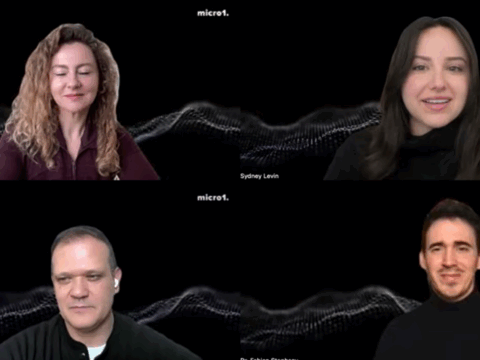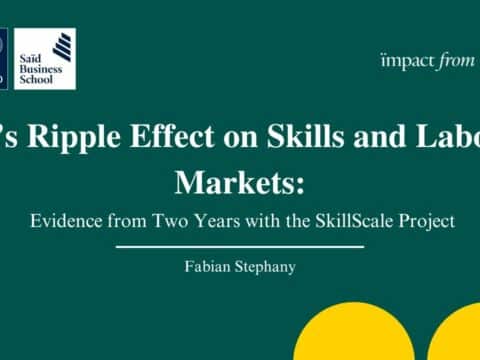


Fabian Stephany is a Departmental Research Lecturer at the Oxford Internet Institute (OII), University of Oxford and a Senior Research Fellow with the Institute for New Economic Thinking at the Oxford Martin School. He is also a Future of Work fellow at the Brussels-based think tank Bruegel, an inaugural fellow at Microsoft’s AI Economy Institute, and a research affiliate at the Humboldt Institute for Internet and Society in Berlin. Additionally, he currently serves as a member of the World Economic Forum’s Global Future Council for Human Capital Development.
At the OII, Fabian leads the SkillScale project, which views skills as a central lens through which to understand today’s labour market transitions. By examining how work quality, job growth, and labour market equitability and sustainability respond to technological change, the project investigates how AI skills are becoming increasingly pivotal for workers and employers alike. As part of his Microsoft fellowship, Fabian is currently exploring the role of AI skills in employability—particularly how working with generative AI enhances job prospects and addresses the gender gap between men and women.
Fabian is also a co-creator of the Online Labour Observatory—a digital data hub hosted in collaboration with the International Labour Organization that provides researchers, policymakers, journalists, and the public with insights into online platform work. His research has been published in leading academic journals, such as Research Policy and Scientific Reports, and has received media coverage in outlets around the world, including The Washington Post, The New York Times, The Telegraph, Nikkei Asia, Handelsblatt, and the Frankfurter Allgemeine Zeitung.
He holds a PhD and other degrees in economics and social science statistics from European institutions, including Università Bocconi in Milan and the University of Cambridge. In addition to his academic positions, he has worked as a senior data scientist in the private sector and regularly advises international organisations such as the United Nations Development Programme, the World Bank, and the OECD.
Future of Work, Internet Economics, Network Science, Online Gig Economy, Platform Economy


This programme supports research in the sphere of AI & Work.

Hire AI – Hiring Impact of Recognised Expertise in Artificial Intelligence explores how AI skills influence hiring decisions in modern labour markets.

This project explores how the analysis of online generated labour market data can help us understand the relevance of new skills and sustainability of novel occupations.

With Dr Fabian Stephany
AI is often seen as a job killer — but our latest OII study suggests it could actually help you get hired. A new international experiment shows that AI skills significantly improve a candidate’s chances of being invited to an interview.

With Dr Fabian Stephany
In this session from the micro1 × Microsoft AIEI “Reshaping the Future of Work” virtual series, Dr. Mark Esposito moderated a conversation with Dr. Fabian Stephany and Dr. Diana Tuman.

With Dr Fabian Stephany
Fabian Stephany presents the latest findings on the changing relevance of AI skills at the Oxford Future of Professionals seminar with Saïd Business School, University of Oxford.

With Dr Fabian Stephany
Watch Dr Fabian Stephany sharing key findings from his latest co-authored research which examines shifts in the labour market and the growing trend of skills-based hiring in the AI sector.

3 March 2025
New analysis from researchers at the Oxford Internet Institute examines how businesses in the UK are responding to the hiring gaps in AI-related recruitment, and whether skills proficiency commands a higher salary than a higher education degree.

17 May 2024
Dr Gemma Newlands and Dr Fabian Stephany have been named as winners of the Achievement Award at the University of Oxford 2024 Divisional Teaching Excellence Awards.

27 February 2024
2023 was the year AI really made its mark. It's been a wild ride for everyone from office workers to big companies, with even the experts scratching their heads.

24 October 2023
Researchers at the Oxford Internet Institute, University of Oxford, and the Center for Social Data Science, University of Copenhagen, find that the economic value of a skill is determined by how well it can be combined with other worker competencies.

Frankfurter Allgemeine Zeitung (FAZ), 11 February 2026
Dr Fabian Stephany comments on how AI can boost careers, particularly for older applicants and those with lower levels of formal education.

Handelsblatt, 09 February 2026
Dr Fabian Stephany discusses the positive wage effects associated with AI skills.

Fast Company, 30 January 2026
Dr Fabian Stephany draws on his latest research showing how women are less likely to use AI than men.
This course introduces students to conceptual and methodological aspects of social science research methods, including both quantitative and qualitative methods.